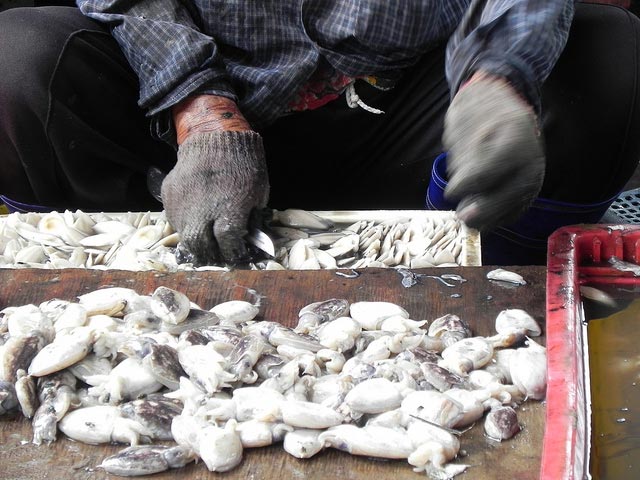
Consumers and workers already doubtful of the benefits to Americans of free-trade agreements recently received new cause for alarm. Hard-pressed US seafood producers are competing with at least some imports caught, farmed or processed by slaves. That’s right, slaves.
The recently released US State Department study “Trafficking in Persons: 2014” reported worsening worker abuses, including slavery and coerced labor, in Thailand and Malaysia. Accordingly, the US lowered Thai and Malaysian human rights ratings to the level of North Korea, Syria and Iran. Similar problems persist in China and Vietnam.
In China, Malaysia, Vietnam and Thailand, men, women and children are subjected to forced labor. Production of wild caught and farmed seafood was one of several industries cited for labor abuses.
Just how bad are these abuses?
“The recruiting and working conditions of many fishers and seafood industry employees are so egregious that these human and labor rights abuses have been referred to as ‘modern slavery,'” reports the nongovernmental organization Fish Wise, which studies and promotes sustainable seafood practices. Most reports of extreme labor abuse come from Asia, including Thailand, Vietnam and China.
In a July 30 SeafoodSource.com Webinar, Daniel Murphy of the London-based Environmental Justice Foundation said half of Thai seafood workers have reported seeing murder on the job and worker suicide is not uncommon.
Yet, the United States imports 90 percent of the seafood it consumes. Most comes from Asia. China is the largest supplier of tilapia to the United States. Vietnam is our nation’s largest supplier of the cheap, white fish pangasius (basa, tra and swai) and Thailand is a major supplier of shrimp, as are Malaysia and other offending nations.
Sadly, it pays to use slaves. Asia-Pacific nations reap $52 billion in illegal profits each year from forced labor in the private sector, says the International Labor Rights Organization (ILO). And today slaves cost about $90 per head only.
How can US food producers compete with nations using slave labor? Why should they be forced by the US government to do so?
Already, many in Congress are raising questions about the human rights and economic impacts of the proposed Trans-Pacific Partnership regional free trade agreement. In May, for instance, 153 Democratic members of Congress called on the administration to press for stronger labor standards within the 12 nations pressing for the agreement with the United States.
If they knew, consumers would likely join the call for fair trade and turn up their noses at Asian seafood. Indeed, research published in March by the nonprofit Fish Wise organization (dedicated to sustainable seafood) found:
• 88 percent of consumers surveyed would stop buying a product associated with human rights abuses;
• 70 percent would pay more for a product unconnected to human rights abuses.
Its long past time to run the fast-track, Trans-Pacific Partnership trade agreement off the rails and into a junk yard.
Jeffrey R. McCord is a free-lance writer on economic issues and author of “Undocumented Visitors in a Pirate Sea,” a quarter-finalist in the 2014 Amazon Breakthrough Novel Award contest. https://www.amazon.com/UNDOCUMENTED-VISITORS-Investigation-Caribbean-Phenomena-ebook/dp/B00FQ4R91I
Join us in defending the truth before it’s too late
The future of independent journalism is uncertain, and the consequences of losing it are too grave to ignore. To ensure Truthout remains safe, strong, and free, we need to raise $24,000 by the end of today. Every dollar raised goes directly toward the costs of producing news you can trust.
Please give what you can — because by supporting us with a tax-deductible donation, you’re not just preserving a source of news, you’re helping to safeguard what’s left of our democracy.